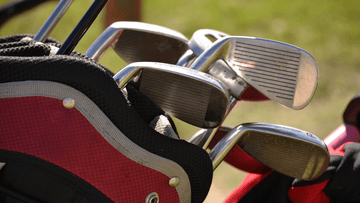Subscribe to our mailing list for insider news, product launches, and more.


The golfclubs4cash commitment to sustainability
Sustainability lies at the heart of everything we do at golfclubs4cash. When you buy used golf equipment as opposed to brand new, you’ll be saving yourself plenty of money while also making an eco-conscious choice at the same time.
By its very nature, buying and selling used golf equipment is a great way of reducing pressure on landfill sites, and promoting the benefits of reducing waste by reusing and recycling. We’re encouraging people to consciously think of reusing golf clubs (which is even better for the planet than recycling) in the same way that they approach buying refurbished mobile phones, smart devices, and even cars.
Reusing is more carbon-beneficial than recycling and is a key component of a ‘Circular Economy’,” explains Dean Cracknell, Head of Marketing at golfclubs4cash. “By putting products back into circulation, we extend the product life and reduce the need for future manufacturing. These combine to give us a significant carbon emission saving.
By its very nature, buying and selling used golf equipment is a great way of reducing pressure on landfill sites, and promoting the benefits of reducing waste by reusing and recycling. We’re encouraging people to consciously think of reusing golf clubs (which is even better for the planet than recycling) in the same way that they approach buying refurbished mobile phones, smart devices, and even cars.
Reusing is more carbon-beneficial than recycling and is a key component of a ‘Circular Economy’,” explains Dean Cracknell, Head of Marketing at golfclubs4cash. “By putting products back into circulation, we extend the product life and reduce the need for future manufacturing. These combine to give us a significant carbon emission saving.
Here are just some of the ways we are taking action to reduce our carbon footprint and do our bit for the planet and its finite resources
We monitor and offset our carbon usage - see below for more details.
We’re one of 1000s of businesses subject to the Scottish government’s 2019 Climate Change Act, which commits Scotland to net-zero emissions of all greenhouse gases by 2045. That’s 5 years ahead of the rest of the UK!
Our carbon-neutral courier guarantees that every parcel they deliver for us is carbon-neutral. They measure their CO2 emissions, strive to reduce them, and offset the remaining emissions.
No product arrives at or leaves the golfclubs4cash premises in virgin packaging. Every element, from the box the club travels in, to the tape used to seal it, is made from recycled materials, and these can all be reused or repurposed. We’ve removed all plastics from our packaging.
We encourage our customers to trade in their clubs - we’ll always find a home for them. They’re far better off in someone else’s golf bag rather than in landfill.
We stock over 25,000 used golf clubs on our shelves at any one time. That’s 25,000 clubs we’ve saved from filling-up landfill sites.
We are champions of Sustainable Golf Week. Pioneered by the Geo Foundation, it’s a fantastic initiative that we fully support, not just for one week, but also for the other 51 weeks of the year.
We want to make golf not just more sustainable, but more accessible too. For our 10th birthday, we partnered with The Golf Trust to run a scheme to remove barriers to participation in golf.
We’re one of 1000s of businesses subject to the Scottish government’s 2019 Climate Change Act, which commits Scotland to net-zero emissions of all greenhouse gases by 2045. That’s 5 years ahead of the rest of the UK!
Our carbon-neutral courier guarantees that every parcel they deliver for us is carbon-neutral. They measure their CO2 emissions, strive to reduce them, and offset the remaining emissions.
No product arrives at or leaves the golfclubs4cash premises in virgin packaging. Every element, from the box the club travels in, to the tape used to seal it, is made from recycled materials, and these can all be reused or repurposed. We’ve removed all plastics from our packaging.
We encourage our customers to trade in their clubs - we’ll always find a home for them. They’re far better off in someone else’s golf bag rather than in landfill.
We stock over 25,000 used golf clubs on our shelves at any one time. That’s 25,000 clubs we’ve saved from filling-up landfill sites.
We are champions of Sustainable Golf Week. Pioneered by the Geo Foundation, it’s a fantastic initiative that we fully support, not just for one week, but also for the other 51 weeks of the year.
We want to make golf not just more sustainable, but more accessible too. For our 10th birthday, we partnered with The Golf Trust to run a scheme to remove barriers to participation in golf.
Our carbon monitoring and offsetting in detail
We monitor and offset our carbon usage with Circular Economy Consultancy Circulogic Ltd, as part of a joint commitment to transparent reporting and a desire to make golf more sustainable. Over a 12-month study, Circulogic found that by extending the lifecycle of golf clubs, golfclubs4cash contributed to a saving in carbon emissions of 4,158 tonnes, corresponding to 14.36 million road miles - the equivalent to removing over 2210 petrol cars from the road over the 12-month period.
“By facilitating the extended use of products, in this case golf clubs, golfclubs4cash is avoiding the production of Green House Gas (GHG) emissions and environmental damage caused by the extraction, manufacture and supply of new products,” explains founder of Circulogic, Dr Geoff Sampson who produced the analysis. “Our bespoke carbon modelling estimates the carbon benefits of golf-sector reuse-based businesses such as golfclubs4cash and the initial results are impressive. This is an example of a business delivering sustainable reuse at scale”
“When we launched the business, we didn’t even know what a circular economy was, let alone the significance that our business model would have in terms of sustainability over the coming years,” explains co-owner of golfclubs4cash Murray Winton. “By refurbishing and reselling unwanted golf clubs, we extend their natural life. Once these products enter the resale market this completes the loop that is commonly known as a circular economy. There will always be demand for new products but re-using those that are already in circulation is incredibly important.
“By facilitating the extended use of products, in this case golf clubs, golfclubs4cash is avoiding the production of Green House Gas (GHG) emissions and environmental damage caused by the extraction, manufacture and supply of new products,” explains founder of Circulogic, Dr Geoff Sampson who produced the analysis. “Our bespoke carbon modelling estimates the carbon benefits of golf-sector reuse-based businesses such as golfclubs4cash and the initial results are impressive. This is an example of a business delivering sustainable reuse at scale”
“When we launched the business, we didn’t even know what a circular economy was, let alone the significance that our business model would have in terms of sustainability over the coming years,” explains co-owner of golfclubs4cash Murray Winton. “By refurbishing and reselling unwanted golf clubs, we extend their natural life. Once these products enter the resale market this completes the loop that is commonly known as a circular economy. There will always be demand for new products but re-using those that are already in circulation is incredibly important.

More blogs and guides
How to build a set of affordable golf clubs for less than £500
Find out how Euan from our Edinburgh store got on when he was challenged to build a set of forgiving golf clubs...
Read more
Why using golfclubs4cash is miles better for the planet
Our customers have contributed to a saving of nearly 900 tonnes of carbon emissions - that’s approx 3m road miles. Read on...
Read more
The complete guide to buying a second-hand fairway wood
In this guide, we’ll talk you through the features of a fairway wood and help you decide on the right specification for...
Read more
Couples Who Golf Together, Stay Together
Nothing says “I love you” quite like a round of golf with your better half. Forget candlelit dinners and heart-shaped balloons—hitting the...
Read more









